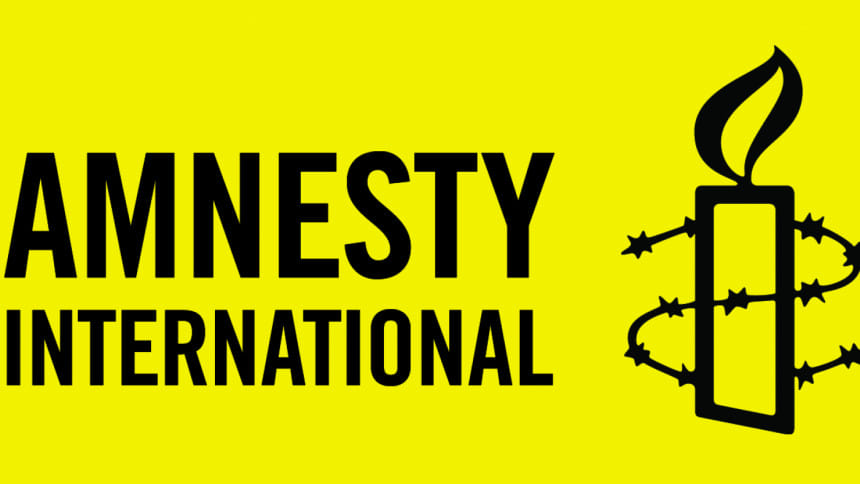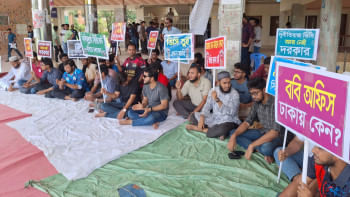End crackdown, free protesters

Amnesty International has called on Bangladesh to end the ongoing crackdown on the road safety protesters.
Various law enforcement agencies arrested nearly 100 people, including some on charges of spreading “rumours” under a controversial provision of cybercrime law, the AI said in a statement on Friday.
The arrests came two weeks after thousands of school students took to Dhaka streets demanding safe roads. And now a pall of fear has gripped the civil society with protesters being subjected to “intense surveillance online and arbitrary arrests”.
“The Bangladeshi authorities must end this crackdown and release all protesters who were peacefully exercising their human rights,” said Omar Waraich, AI's deputy South Asia director.
“The students were overwhelmingly peaceful, and only a tiny minority of people were involved in violence. Their actions must not become a pretext for an attack on civil society where dissent is punished and people live in fear that they will be arrested next,” he said.
A total of 97 students are known to have been arrested so far. At least 51 cases were filed between July 29 and August 15, charging 5,000 unnamed people for a range of offences under “draconian laws” inconsistent with international human rights law and standards, including an arbitrary ban on “unlawful assembly”.
No action has been reported to investigate and prosecute police officers that used unnecessary and excessive force against the largely peaceful protestors, or members of the pro-government student front Chhatra League, who were allegedly using machetes, tree branches and metal rods to attack students and journalists, as reported by victims and witnesses, said the rights watchdog.
Students and other activists say they are being subjected to intensive surveillance, online and offline, leaving them fearful of commenting on the protests on social media and even seeking medical help for injuries sustained during the protests.
A private university student, who was hit by rubber bullets fired by the police on August 6, told Amnesty International: “Police are using CCTV footage to identify students and pick them up. Many students who suffered injuries after the police fired rubber bullets are not even going to the hospital to receive treatment out of fear of arrest. They are still living in a lot of fear and trauma. We do not know what may happen. Our movement was non-violent but we've been labelled as members of the [Jamaat-e-Islami] party.”
In a series of public statements, the Bangladesh government sought to cast the student protests as an attempt by the BNP and Jamaat to “destabilise the government” ahead of general elections later this year.
The authorities have also arrested three other people under section 57 of the ICT Act. They include photographer Shahidul Alam, actress Quazi Nawshaba Ahmed, and Faria Mahjabin, owner of a Dhaka café.
Section 57 has long been used as an “instrument to criminalise people” for freely expressing their views and opinions.
“The government has itself conceded that section 57 of the ICT Act is flawed, and yet it persists with its use. Shahidul Alam, Quazi Nawshaba Ahmed, Faria Mahjabin and all of the students who were arrested solely for peacefully exercising their human rights are prisoners of conscience. They must be released immediately and unconditionally,” said Omar Waraich.
CONCERN ABOUT SHAHIDUL'S HEALTH
National Geographic has expressed deep concern regarding the health and well-being of renowned photographer Shahidul Alam.
In a statement on Thursday, it said, “National Geographic is deeply concerned about the health and well-being of renowned photographer, educator and humanitarian Shahidul Alam. A bright light in the photographic community, Mr Alam is currently being detained in his native Bangladesh. We join together with others across the world who are troubled by Mr Alam's arrest and support his immediate and safe release.”
Meanwhile, Shushashoner Jonno Nagorik (Shujan) yesterday expressed deep concern at the arrest and harassment of students over the quota reform and safe roads movements and demanded unconditional release of the arrestees.
In a statement, Shujan said, “We are noticing with concern that the students who led the two movements are being arrested and harassed in different ways.”
It said no action has been taken against those who attacked the students and journalists during the movements.

 For all latest news, follow The Daily Star's Google News channel.
For all latest news, follow The Daily Star's Google News channel. 



Comments